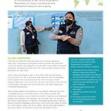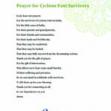

Nepal Quake Home Reconstruction
Job skills are the construction materials of a better life.
Sanju Bishwakarma’s day starts like most women's in mountainous districts in Nepal–she cooks for her family, washes a small bucket of laundry and tames her daughter’s hair into braids before she departs for school. Then, Sanju’s morning takes a sharp detour from the routines most women in her community have followed for generations.
Instead of continuing with household work or leading goats out to pasture, Sanju picks up a measuring tape and walks to a construction site on the other side of the village. She hoists one end of a bundle of rebar and gets to work.
Following two devastating earthquakes in Nepal in 2015, the country faced the daunting prospect of rebuilding over 800,000 homes. The government of Nepal and organizations like CRS and our partner, Caritas Nepal, knew that there weren’t enough masons to build those houses, and existing masons would need to learn new techniques to make homes stronger in future earthquakes. The scale of the disaster meant that thousands of people needed to learn new skills.
CRS shelter experts coordinated with the government of Nepal and created masonry training at two levels. Skilled masons who had experience building houses of stone, brick or cement could take a 7-day training where they learned earthquake-resilient construction techniques. Unskilled workers, such as Sanju, were offered 50-day training that included a full masonry course and the quake-resilient techniques.
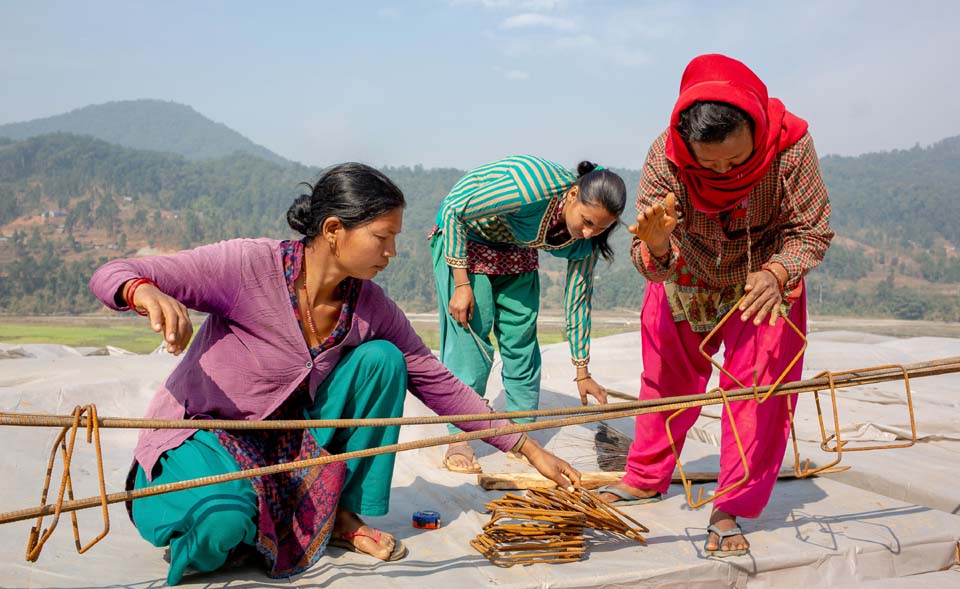
Sanju has a strong reputation for masonry work, especially her skill at binding rebar into the frames that will eventually support cement columns.
Photo by Jennifer Hardy/CRS
Sanju saw an opportunity. She had worked on the periphery of construction sites as a day laborer, but never had the chance to learn how to build a strong home or work as a skilled mason.
“I worked in construction for a long time, but I would get jobs like breaking and carrying stones,” Sanju explained. “I was limited to certain activities.”
Sanju took the 50-day masonry course. It has made all the difference. In Nepal, as everywhere in the world, job skills are the construction materials of a better life.
“The good thing about it, besides enjoying the job more, is that I don’t have to go looking for work. I’m experienced and people know about my work so there's always somebody to hire me. Previously it was labor driven–if there was enough work, I would get a job. Now it’s driven by technical demand. I feel that I have an edge to be more continuously employed.”
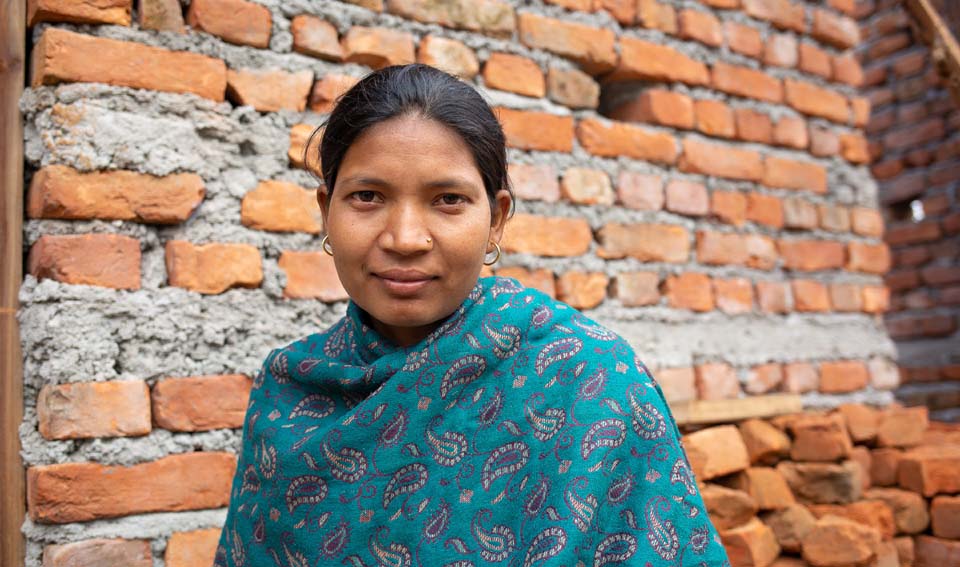
Sanju is pictured in front of her partially-constructed home. She has done all the work herself, including design and foundation footings, and she has paid for all materials with her earnings as a lead mason.
Photo by Jennifer Hardy/CRS
Higher wages accompany a technical skillset, too. As a basic laborer, Sanju earned the equivalent of about $5 to $6 per day. Now, she can earn $8 to $10 for the same work.
That extra cash has been essential as Sanju rebuilds her own home alongside her husband. Although they are eligible for government reconstruction grants, an administrative error in registration means she still hasn’t received the first installment. The family couldn’t wait for the error to be rectified before starting construction, so they put everything they could spare into building materials.
Their house is taking shape and when everything is cleared up under the government program, some of those costs will be reimbursed.
Although only one room has a roof, giving them a place to sleep and store their possessions, the major tasks of pouring a foundation and building walls are well underway. Sanju has done almost all the construction herself. In the process, she put advanced skills from her training to use.
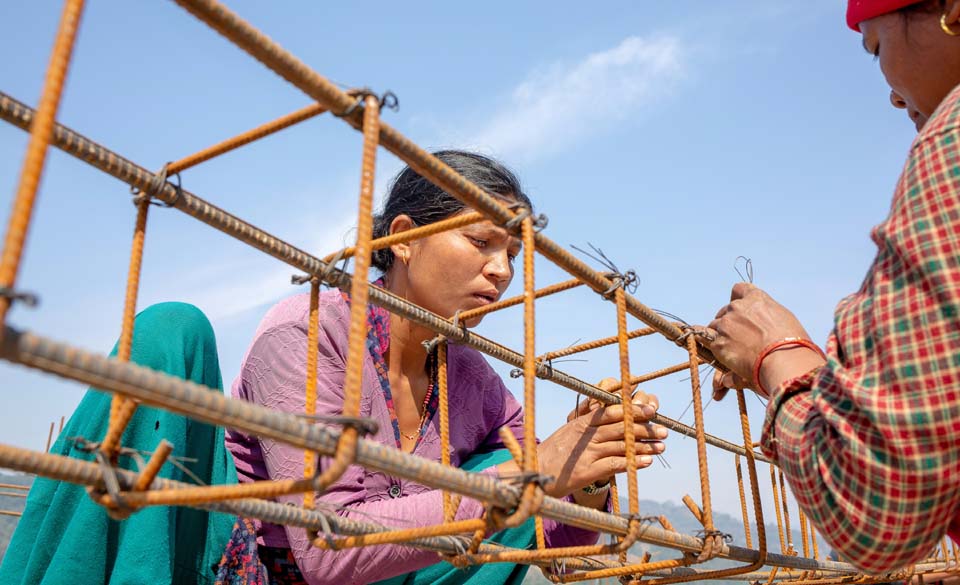
Higher pay, steady work, and more confidence are a few of the benefits Sanju realized following her masonry training.
Photo by Jennifer Hardy/CRS
“Now I know how to do pretty much everything,” Sanju says, “even the foundation where I’m sitting. I didn’t know how to read and write, but now I know how to measure properly. I know how to give a rough estimate. I know how to make straight walls and the tools used in masonry, proper tools.”
Her new skills have led to ever-increasing confidence rooted in job experience.
“I require help sometimes, but I’m focused on learning, and I know my strength and weakness because I’m working every day,” she says. “I hope to improve. When my friends go to look for different jobs, I take the lead. When I am there, my friends feel more comfortable—they need the support of someone who is confident.”
Her work also boosts her family’s income, provides for more nutritious food, and enables her to pay private school fees for her 7-year-old daughter, Arati. Sanju is also inspiring other people in her community, even as she’s filling an untraditional role.
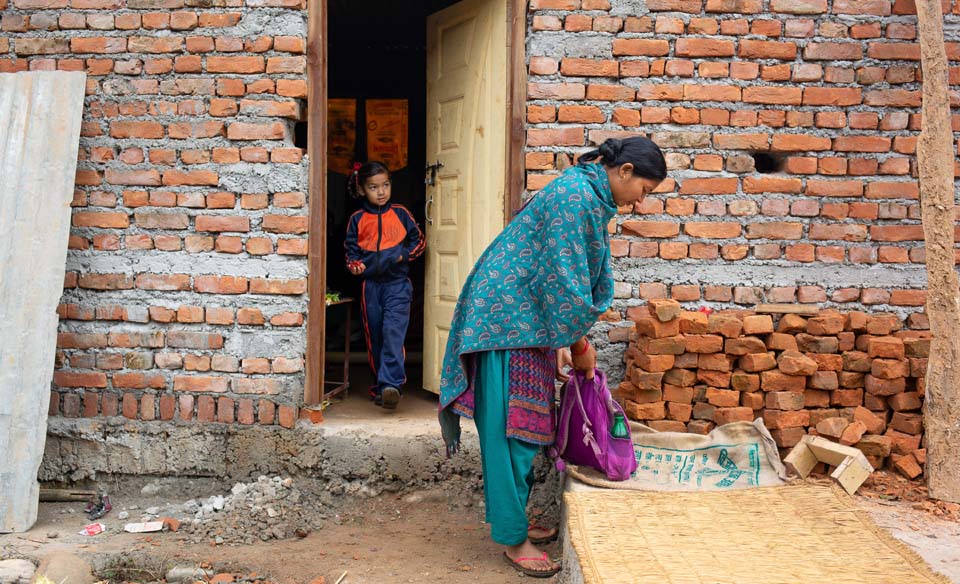
Sanju Bishwakarma helps her daughter Arati get ready for school outside their partially finished home. Additional income from Sanju’s masonry work has helped the family purchase building materials and paid Arati’s school fees.
Photo by Jennifer Hardy/CRS
In fact, some homeowners in nearby communities have been reluctant to hire female masons. But as a recognized leader whose skills are in high demand, Sanju says she hasn’t faced challenges getting work in her village.
“Normally I'm so busy with my work that I don’t have to stay idle,” she explains. “People who don’t know about masonry might say it's a man's job, but I have never faced that problem.”
As she works, Sanju and masons like her aren’t on their own in making sure houses properly incorporate improved techniques. CRS and our partners provide ongoing technical assistance.
That support, repeated across 20,000 families CRS has worked with in Gorkha district, has given more than 2,600 masons like Sanju access to skills that ensure families sleep in safer homes.
Sanju has no plans to go back to a traditional role at home—and the income from her work building houses is setting the stage for her daughter’s best future too.
While many households have rebuilt their homes using all required earthquake-resilient construction techniques, many more remain in need of reconstruction. That ongoing demand means that Sanju will have work well into the future. She’s planning to continue upending traditional views of women’s work—and taking pride in the homes she’s helped rebuild in her community.
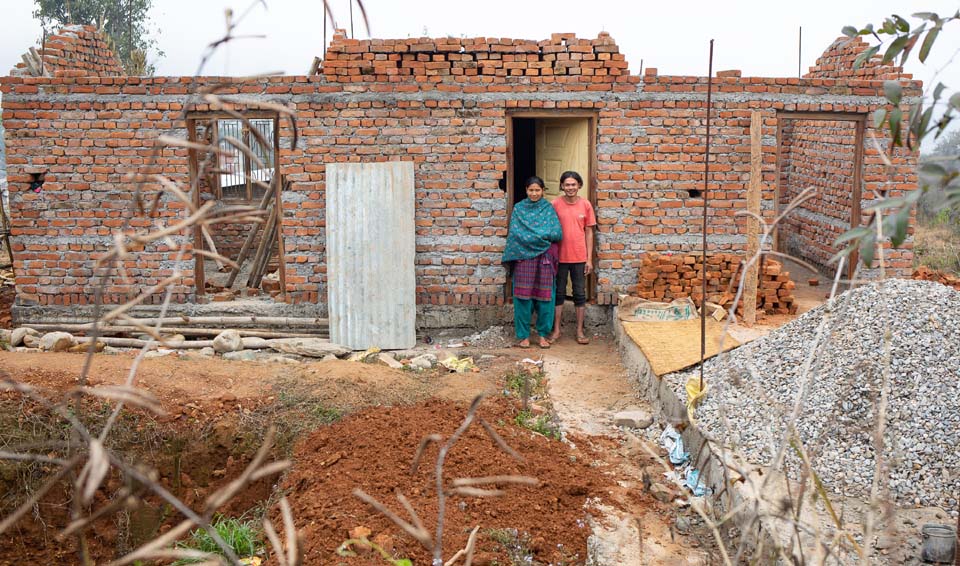
Sanju and her husband, Hira Bishwakarma, have so far constructed walls and a temporary roof over one room of their future home.
Photo by Jennifer Hardy/CRS
Sanju’s story is just one example of how your support has enabled Nepal earthquake survivors to rebuild their homes and create sustainable employment. As in Sanju’s case, the government program pays for only a portion of reconstruction costs. Continued support of CRS recovery work in Nepal means more families will be in safer homes as quickly as possible.
